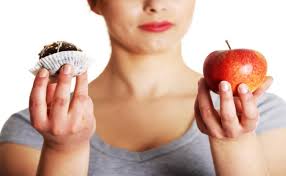How often are you overcome with the desire to devour a chocolate bar or cheeseburger? Even the most nutrition-conscious people have to learn how to cope with cravings, sometimes for not-so-nutritious foods. You might think that a longing for these unhealthy treats results from emotions, and that could be true — but not necessarily.
Cravings are usually stimulated by emotional cues, but then fueled by physiological ones as we imagine what it would be like to eat the food we want to have. So to avoid mindless munching, you’ve got to determine the causes of your cravings and be set up with strategies to subdue them. Read on for tips to help you do just that.
Ask Whether You’re Hungry
It might seem simple, but people often neglect to determine their level of hunger before they start noshing. “Take a three-minute time-out and ask yourself, ‘What do I want? How am I feeling?’” advises Caroline Cederquist, M.D., a Naples, Florida–based physician who specializes in weight management. “Identifying that there may be no actual hunger is the first step in not giving in to every craving.” Keep in mind, though, that you very well could be starving and need to eat a full meal, says Wansink; if that’s the case, try consuming a healthy dish and then reassessing your desire.
Consider What Your Body Needs
“All cravings are important because they give you clues to what you’re feeling but also what’s happening in your body biochemically and metabolically,” says Cederquist. Some are a sign that your body needs more of certain nutrients. For instance, a strong taste for red meat could be a hint that you’re low on iron.
A blood test can measure whether you need to load up on any vitamins or minerals in particular. These sort of cravings that suggest a nutrient deficiency generally only occur in cases of extreme deprivation or pregnancy, though, notes Cederquist.
Pay Attention to What You Crave
Your want for certain types of fare could also be a warning sign that you have a health issue worth addressing. If you’re constantly reaching for sweets and starchy foods, for example, it might mean that your body isn’t metabolizing carbohydrates normally, says Cederquist. That means your body isn’t able to move glucose into your cells for energy, so you end up feeling deprived and wanting to eat more carbs.
“This can occur even after someone has eaten a full meal,” she says. “It makes people think their cravings must be emotional, but it’s not necessarily the case.”
If you feel that might be the culprit behind your cravings, see a medical professional.
Stop the Train of Thought
Once a craving comes on, says Wansink, “We tend to keep imagining what it would be like to eat the food we have in mind — the texture, crunch, smoothness, richness, and so forth. Doing that makes the craving more extreme.” Therefore, distracting yourself from the thought can be enough to make you forget about it. He advises chewing sugar-free gum, as simply having something in your mouth will eliminate your ability to imagine having food
Look for a Distraction
Before you start nibbling on whatever your mind wants, take a few minutes to drink a glass of water or walk around the block. These two steps help, says Cederquist, because they separate you from the craving. “That separation gives you the time and space to reflect upon the healthy diet you’re trying to maintain and how eating this food might take you off-course from that plan,” she says.
Another option is to sip something warm, like a cup of herbal tea. Drinking a hot beverage takes time, is filling, and stimulates the vagus nerve — which helps manage digestion and can decrease cravings, especially for sugary foods, says Cederquist.
If you follow these tips and still feel compelled to devour certain foods, Cederquist recommends consulting your doctor; he or she can test your levels of glucose, insulin, glycohemoglobin, triglycerides, and HDL — which can all be helpful to identify conditions such as metabolic dysfunction. Making a diagnosis like that can be your first step in figuring out a meal plan that can negate those nagging cravings and keep your weight in check.


